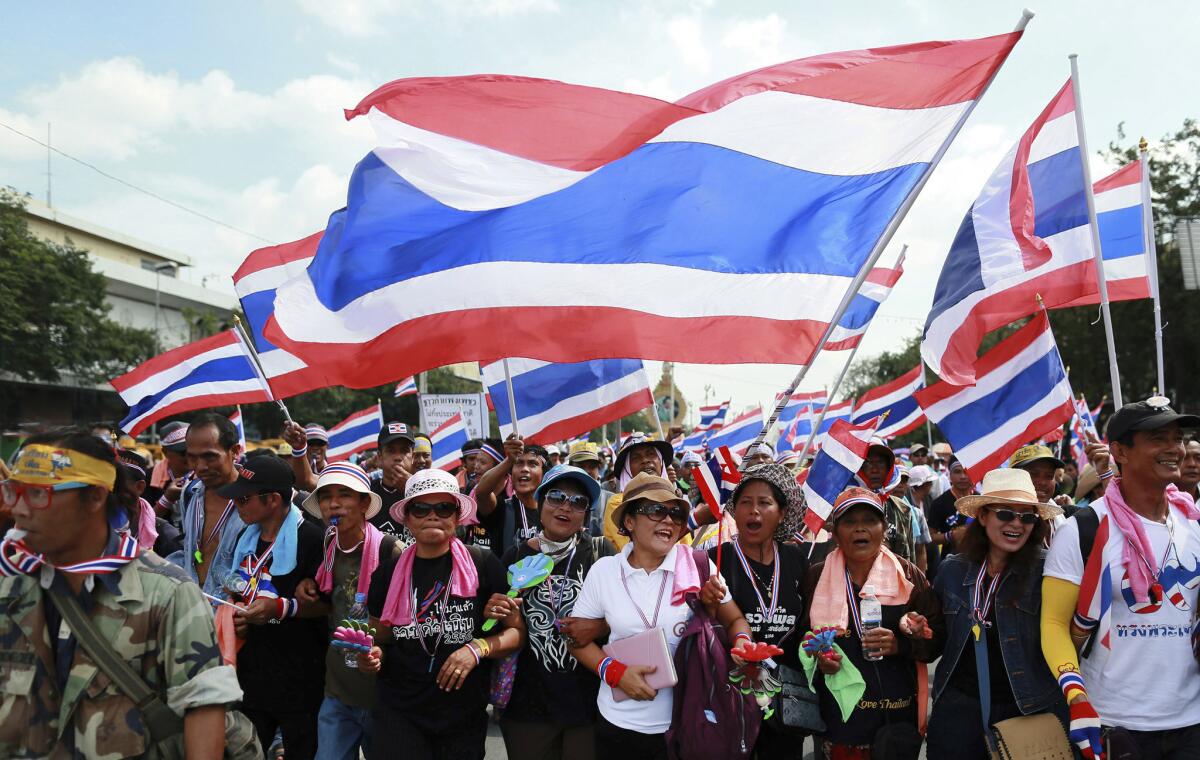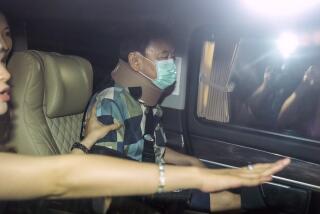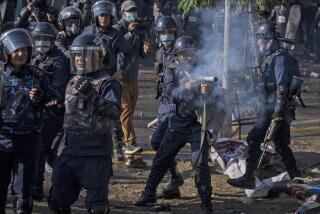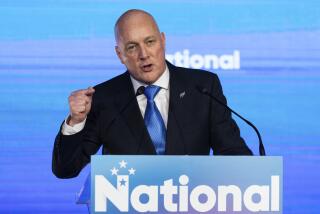Thai premier survives no-confidence vote, but protests continue

NEW DELHI – Thailand’s prime minister easily survived a no-confidence vote Thursday, but hundreds of protesters continued to besiege ministries in the capital as her embattled government sought a way out of its political crisis.
Prime Minister Yingluck Shinawatra’s ruling Pheu Thai party prevailed in parliament by a vote of 297 to 134. The opposition hoped to unseat the government but members of Yingluck’s party held firm in their commanding majority to blunt the challenge.
Footage showed her smiling broadly dressed in a dark suit and gold necklace as the vote was announced.
But her bigger challenge is out on the streets. While the number of protesters on Thursday was lower than in the previous three days, most have jobs, making it unclear whether this was a temporary lull before the weekend or evidence of the movement losing steam.
The crisis was sparked by a bill presented in parliament last month that would have granted amnesty to Yingluck’s older brother, former leader Thaksin Shinawatra, following his 2008 conviction on corruption charges. The motion was defeated, but it awakened opponents of Thaksin, who accused him of buying his sister’s landslide election and directing her administration from abroad.
The issue has also reopened a deep split between poorer, mostly rural Thais known as “red shirts” who feel they have not benefited from the nation’s prosperity, a group from which Thaksin and Yingluck draw their support, and a middle and upper class broadly aligned with the nation’s military and monarchy, known as “yellow shirts.”
The two sides, named after the T-shirts they often wore to identify themselves, clashed in 2010 after red shirts occupied parts of the capital for two months, ending in an assault by the army that killed dozens.
In a television address, the prime minister appealed for calm, calling on the anti-government activists to end their protests and enter into talks. “The government doesn’t want to enter into any political games because we believe it will cause the economy to deteriorate,” she said.
Yingluck has vowed not to use force against the anti-government demonstrators, gambling that they’ll run out of steam. Footage on Thursday showed bands of protesters waving flags, blowing whistles and blocking traffic as they marched on the defense and education ministries and national police headquarters.
Protesters also pulled down several power cables outside police headquarters and a nearby hospital, forcing them to use generators, police said Thursday.
“I will not dissolve the house,” Yingluck told reporters before the vote in parliament. “Let us find a way out of this together.”
Protest leader Suthep Thaugsuban, a former lawmaker with the Democrat party, has called for an end to the “Thaksin political machine,” although analysts say it’s unclear what his objectives are. He’s pledged to replace Yingluck’s government with a non-elected council, prompting critics to question his democratic credentials. And he’s so far refused to consider talks with the government. “No more negotiations,” he told crowds late Wednesday after they gathered outside government ministries.
Protesters have occupied the Finance Ministry since Monday but haven’t succeeded in making their way into other ministries as threatened.
Analysts said they don’t see any early resolution. “The government has the majority and it won’t resign, so this is a deadlock and I don’t see any end to it,” said Vanchai Ariyabuddhiphongs, a researcher at Bangkok University’s Graduate School. “There was some talk about negotiations by getting a third party, but I don’t see any third party willing to negotiate in this. The demonstrations are unabated so far. It seems this is how it is going to be.”
The protests have prompted several countries to issue travel advisories, and U.N. Secretary General Ban Ki-moon this week urged all sides to exercise restraint, respect human rights and abide by the rule of law.
Thaksin, a deeply polarizing billionaire who amassed a telecommunications fortune, was elected in 2001 by appealing to the marginalized and became the first popularly elected leader to serve out his full term in a country with a history of military coups.
In 2006 a year into his second term, however, he was ousted by the military, fleeing overseas in 2008 shortly before graft and abuse of power charges were brought against him. He’s lived since then in self-imposed exile in Dubai and London.
ALSO:
Giant designer trunk on Moscow’s Red Square sent packing
Colombia recalls envoy to Nicaragua amid dispute about Caribbean
Merkel’s conservatives strike power-sharing deal with German rivals
Mark.Magnier@latimes.com
Tanvi Sharma in the New Delhi bureau contributed to this report.
More to Read
Start your day right
Sign up for Essential California for news, features and recommendations from the L.A. Times and beyond in your inbox six days a week.
You may occasionally receive promotional content from the Los Angeles Times.






